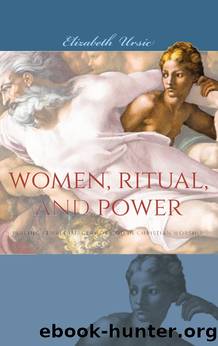Women, Ritual, and Power by Ursic Elizabeth;

Author:Ursic, Elizabeth;
Language: eng
Format: epub
Publisher: State University of New York Press
Published: 2014-08-15T00:00:00+00:00
REFLECTIONS FROM CURRENT CANDIDATES FOR MINISTRY
There is less controversy today about inclusive language than in the past. It may still be consciously attended to in liturgy, but the subject rarely draws headlines in church bulletins, sermons, or liturgy meetings anymore. Professors at the University of Edinburgh Divinity School have commented that few undergraduate students use inclusive language in their papers and few show concern, even when it is brought to their attention.
To get a better understanding of current attitudes about inclusive language in church and society, I conducted a group interview with Church of Scotland candidates for ministry who were studying at the University of Edinburgh. In addition to their academic study, these candidates were also working in ministry placements where they learned to prepare and lead worship. By graduation, they would have served at three five-month church placements to experience the variety of congregations, church ministries, and liturgical styles occurring in the Church of Scotland today.
As the candidates entered the room, it was easy to see how much had changed since the 1980s regarding gender and church work. More than half of the candidates were female, and almost everyone was studying to become an ordained minister of the Word and Sacrament. Reflecting changing attitudes regarding gender and work, the one candidate studying to become a deacon was male. The Deacon position had traditionally been called Deaconess and was traditionally held by women in the Church of Scotland; they were even sometimes referred to as âProtestant nuns.â
Nine of the fourteen candidates attended the meeting, and they were a lively and collegial group. During our discussion, their thoughtful reflections were punctuated with good-natured joking with each other. They ranged in age from mid-twenties to early fifties. Six had grown up in the Church of Scotland, and three had converted from Anglican and Lutheran traditions.
All of the candidates were familiar with the term âinclusive language.â When I asked them to provide examples, most gave examples for humankind rather than for God. âThe psalm, âBrother let me be your servant,â becomes âBrother Sister let me serve you.âââ âThe scripture âBlessed are all men whoâ becomes âBlessed are all those whoâ or âBlessed are all that.âââ42
The candidates were less concerned about gendered language for God because they felt the language issue was more complex. As one candidate explained, âI donât think gender is so much about God because God is so much bigger than what we can put into words anyway.â When asked for examples, most said they would expect to hear terms like âCreator God,â âSustaining God,â or âRedeeming God,â rather than the feminization of God. âIt is other language to explain properties of God. Less about pronouns, more about ⦠awesomeness.â
There was also a definite desire among the candidates to move beyond defining inclusive language solely in terms of gender. âIt is not just a gendered context. It is the way we use language in a de-humanizing way.â All the candidates felt strongly that inclusive language needed to be defined more broadly. They wanted to stay away from language that reinforced racism, classism, or any form of alienation.
Download
This site does not store any files on its server. We only index and link to content provided by other sites. Please contact the content providers to delete copyright contents if any and email us, we'll remove relevant links or contents immediately.
The Lost Art of Listening by Michael P. Nichols(7164)
Why I Am Not A Calvinist by Dr. Peter S. Ruckman(4046)
The Rosicrucians by Christopher McIntosh(3372)
Wicca: a guide for the solitary practitioner by Scott Cunningham(3044)
Signature in the Cell: DNA and the Evidence for Intelligent Design by Stephen C. Meyer(2878)
Real Sex by Lauren F. Winner(2866)
The Holy Spirit by Billy Graham(2776)
To Light a Sacred Flame by Silver RavenWolf(2676)
The End of Faith by Sam Harris(2634)
The Gnostic Gospels by Pagels Elaine(2398)
Waking Up by Sam Harris(2331)
Nine Parts of Desire by Geraldine Brooks(2280)
Jesus by Paul Johnson(2227)
Devil, The by Almond Philip C(2205)
The God delusion by Richard Dawkins(2188)
Heavens on Earth by Michael Shermer(2188)
Kundalini by Gopi Krishna(2093)
Chosen by God by R. C. Sproul(2055)
The Nature of Consciousness by Rupert Spira(1981)
